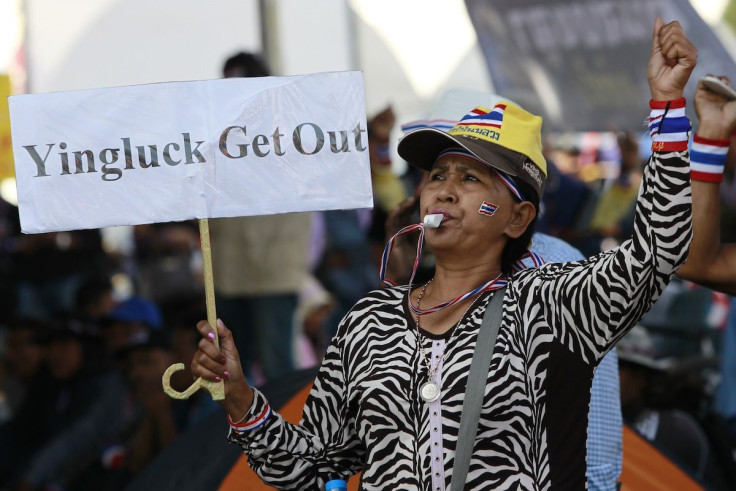What Bangkok State Of Emergency Means For Thailand Tourists

Authorities in Thailand began imposing a state of emergency Wednesday in an attempt to regain control of Bangkok after more than a week of mass street demonstrations by anti-government protesters aimed at toppling the government of Prime Minister Yingluck Shinawatra.
Thailand’s labor minister declared the state of emergency after two explosions rocked the largely peaceful protests on Friday and Sunday. The 60-day decree applies to Bangkok and the surrounding areas and allows the government to declare parts of the country off limits, impose curfews, censor the media, detain suspects without charge and ban political gatherings of more than five people. The government assured, however, that it “will not use force” and has “no policy to disperse” the protesters.
The U.S. Department of State issued a travel alert for Thailand late Sunday warning U.S. citizens of the “unpredictable and ongoing demonstration activity” ahead of Thai general elections, scheduled to take place on Feb. 2.
“U.S. citizens are advised to avoid all protests, demonstrations and large gatherings. Some protest sites are located near tourist attractions and popular shopping malls, which at times have closed or shortened hours unexpectedly. Protests may occur in other areas with little or no prior notice.”
The State Department said to consider using public transportation and allow extra time when traveling throughout the city or to and from airports. It added that, although many protest activities have been peaceful, “increasingly violent incidents have occurred at or near protest sites.”
An explosive device detonated amid a protest march near the National Stadium and MBK shopping mall in central Bangkok on Jan. 17, resulting in at least 39 injuries and one death. Another device exploded in a crowd of demonstrators at Victoria Monument on Jan. 19, resulting in at least 29 casualties. The State Department noted that police have used tear gas, rubber bullets and other measures to defend government facilities at several protest camps throughout Bangkok.
Demonstrations first erupted in November when the government attempted to force through a political amnesty bill that would have enabled the return of former leader Thaksin Shinawatra, Yingluck’s billionaire brother who was ousted in a military coup in 2006 on charges of corruption. Thaksin now lives in self-imposed exile in Dubai to avoid a prison term, though he argues his punishment was politically motivated.
Many protesters claim that Yingluck’s government is, in fact, controlled by her brother. Fearing that she may win the Feb. 2 elections on the back of support in the rural north and northeast, they’ve called for her to step down and be replaced by an appointed “people’s council” to push through electoral reforms.
While the vast majority of demonstrations over the past two months have occurred in Bangkok, there have also been smaller protests in other areas, including Phuket and Chiang Mai. These regional demonstrations, however, have had little affect on visitors.
Most banks, hotels, convention centers, restaurants and entertainment centers in the capital remain open, as do all tourist attractions in and around Bangkok such as the Grand Palace, Temple of the Emerald Buddha, Vimanmek Mansion and Siam Paragon. Tourism officials nevertheless urged visitors to avoid rally locations and use the skytrain, subway or airport rail link to get to and from destinations as a precaution against unforeseen traffic delays caused by several road closures.
“It should be stressed that tourists have not been targeted in the ongoing anti-government demonstrations,” the Tourism Authority of Thailand, or TAT, said in a situation update Tuesday. “Although no tourists were hurt by any of the [explosions], tourists are still advised to be vigilant and avoid demonstration areas for their own safety and security.”
Mobility remains the biggest issue facing visitors to Thailand, with protesters regularly cutting off major Bangkok intersections to conduct their marches. As a result, popular tourist areas such as Silom, Asok and the Ratchprasong intersection (home to several international hotels like Four Seasons, Hyatt and InterContinental) have been intermittently inaccessible.
In the runup to the first mass demonstration of the New Year on Jan. 13, protest leader Suthep Thaugsuban assured that the shutdown would not explicitly target tourists, and promised not to disrupt the city’s public infrastructure, including airports, city buses and vans, BTS skytrain, MRT subway and the airport rail link.
Nevertheless, prolonged protests have begun to take their toll on “The Land of Smiles.” Hotel occupancy in Bangkok is expected to fall by 30 to 40 percent in the first quarter of 2014, while TAT predicts a 5 percent decline in visitor numbers for the first quarter if demonstrations continue.
Thailand’s Foreign Ministry said at least 45 countries, including the U.S., Britain, France, Germany, Japan, Canada and Brazil, had issued travel advisories for the nation. Some urged citizens to stay away from protest camps in the capital, while others advised citizens to avoid Bangkok altogether.
TAT, meanwhile, reminded visitors Monday that it had put in place several measures to ensure a warm welcome and safe onward journey. Those measures include a tourist care center at the Sports Authority of Thailand at Hua Mak Stadium and tourist care units at both Suvarnabhumi and Don Mueang international airports to coordinate with all concerned public and private agencies.
TAT said it was working with the Tourist Police, Immigration Bureau, Metropolitan Police Bureau, Railway Police Unit, Tourism Council of Thailand, Thai Hotels Association, Road Passenger Transport Association and Association of Thai Travel Agents to ensure all involved in the tourism industry were united in their efforts.
© Copyright IBTimes 2024. All rights reserved.






















